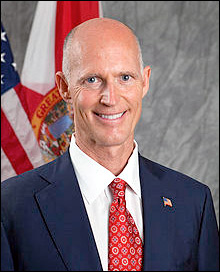By Jim Ellis — Monday, June 24, 2024
President

Robert F. Kennedy Jr. (I) / Photo by Gage Skidmore
For her part, Stein is filing a complaint against CNN with the Federal Election Commission, following Kennedy’s own complaint, disputing the debate criteria as a violation of her rights as a candidate for federal office.
Robert F. Kennedy Jr.: Nevada Ballot Status in Jeopardy — The Nevada Democratic Party is reportedly preparing to file a lawsuit in Nevada state court arguing that Robert F. Kennedy Jr. (I) should be removed from the state’s general election ballot. Their argument is that Kennedy does not qualify under Nevada law as an Independent because he remains a registered Democrat. It remains to be seen if this lawsuit will gain legs.
Senate
New Mexico: Sen. Heinrich Leads by 7 in New Poll — Public Policy Polling went into the field to test the New Mexico electorate (June 13-14; 555 registered New Mexico voters; live interview & text) and projects two-term Sen. Martin Heinrich (D) to hold a seven-point lead over Republican Nella Domenici, 47-40 percent.
Signs are increasing that New Mexico could become more competitive both in the presidential and senatorial contests. With the state’s plurality Hispanic population and the GOP performing better within that demographic, it appears possible for Republicans to record improved numbers in New Mexico’s general election. While it would not now be particularly surprising to see closer election results in November, Republicans are still a long way from winning either at the presidential or senatorial level in the Land of Enchantment.
Emerson College: Releases Series of Senate Polls — The Emerson College polling unit, in conjunction with The Hill newspaper, conducted a series of polls in six Democratic Senate states and released the data late last week. The six domains are Arizona, Michigan, Minnesota, Nevada, Pennsylvania, and Wisconsin. In each place, the pollsters surveyed 1,000 registered voters during the June 13-18 period.
While testing the Senate races in the five most competitive states, excluding Minnesota, Emerson also asked the presidential ballot test question. In all five situations, within the same polling samples that produced Democratic leaders in each Senate campaign, former President Donald Trump simultaneously posted an advantage. Thus, we are already seeing the seeds of an unusually large degree of ticket splitting beginning to develop.
According to the Emerson numbers, Arizona Rep. Ruben Gallego (D-Phoenix) leads 2022 gubernatorial nominee Kari Lake (R), 45-41 percent. Looking at their Michigan results, Rep. Elissa Slotkin (D-Lansing) tops former Congressman Mike Rogers (R), 43-39 percent. In Nevada, Sen. Jackie Rosen (D) enjoys the largest lead of any key swing state; she tops Afghan War veteran Sam Brown, 50-38 percent. Moving east, the Emerson numbers show Pennsylvania Sen. Bob Casey, Jr. (D) a 47-41 percent edge; and, Sen. Tammy Balwin (D-WI), while still leading, sees her margin over Republican Eric Hovde drop to just 46-44 percent.
In addition to Republicans converting the open West Virginia seat, they would have to turnaround one of the aforementioned races, or score a victory in three tight race states that Emerson College didn’t survey, Maryland, Montana, or Ohio, in order to secure an outright majority.






